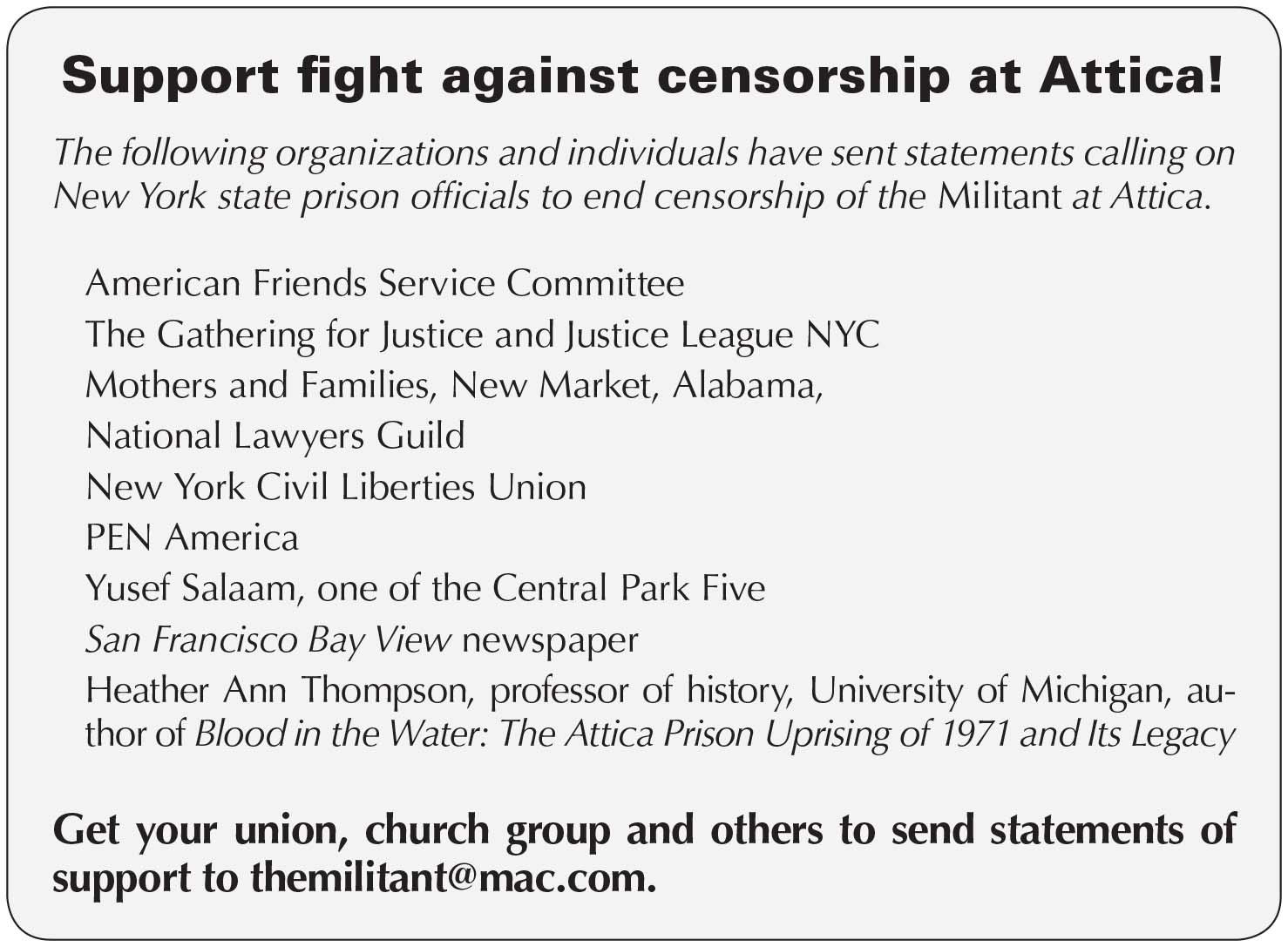
Vol. 80/No.48 December 26, 2016
(front page)
Support grows for fight to reverse censorship of ‘Militant’ at Attica
The Militant subscriber, Jalil Muntaqim (formerly Anthony Bottom), has faced other arbitrary acts of censorship and violation of his constitutional rights by Attica prison authorities.
Last year Attica officials banned four books sent to him, including one of poems that he wrote, and have been interfering with his mail.
The Militant article officials banned “consists of objectively true statements of fact,” wrote David Goldstein, the Militant’s attorney, of the prominent civil liberties law firm Rabinowitz, Boudin, Standard, Krinsky & Lieberman in appeal of the latest censorship.
“It is difficult to conclude that the censoring of this brief article is anything other than a blanket ban on any mention of Attica, of the Attica uprising, or of prisoners’ constitutional rights, unless parroting a viewpoint approved by prison officials,” Goldstein wrote. “However, prison authorities, including at Attica, have no license either to single out The Militant for censorship or to ban reporting on censorship at Attica.”
“Nothing in the article could rationally be construed to ‘advocate’ ‘acts of disobedience,’” Goldstein wrote.
“Whether prison officials agree with what is in the pages of this or any other publication, the men inside of Attica remain citizens of the United States with rights under our constitution,” wrote Dr. Heather Ann Thompson in a statement of support sent to the Militant Dec. 4. “These men have a right to read and to think for themselves and there is nothing on the pages of The Militant that poses a direct or immediate threat to the safety of any prison official or employee inside of Attica.”
Thompson, a history professor at the University of Michigan, is the author of “Blood in the Water: The Attica Prison Uprising of 1971 and Its Legacy.” The book highlights both the humanity of the prisoners who rebelled against atrocious conditions, and the abuse, torture and violence used by police and guards after they regained control of the prison.
Her book was reviewed by dozens of papers leading up to the 45th anniversary of the uprising Sept. 9. The Oct. 3 issue of the Militant featured a front-page article on the rebellion.
The American Friends Service Committee has also spoken out against Attica’s censorship of the Militant. The need for security “should not be exercised in a way that unjustly and unreasonably limits the access to information for those incarcerated,” wrote Lewis Webb Jr. Dec. 2. He is director of the AFSC Healing Justice Program.
“The Militant is great for men and women behind bars to read,” wrote Antonia Brooks, a spokesperson for Mothers and Families of prisoners in Alabama, in a statement calling on New York state authorities to lift censorship of the paper.
Muntaqim — a former member of the Black Panther Party, Black Liberation Army and a founder of the Jericho Movement, which backs the fight for amnesty for political prisoners in the U.S. — was put in solitary confinement on Dec. 6. According to a report at www.freejalil.com, officials apparently objected to his mentioning the Black Panther Party as part of the Black history course he teaches to dozens of fellow inmates.
He has been in jail since he was 19 years old, accused of killing two police officers in 1971. Muntaqim has repeatedly been denied parole. His supporters are calling on Gov. Andrew Cuomo to commute his sentence.
“Attica and the Department of Corrections are acting as if they are above the law,” said Militant editor John Studer. “Those joining the fight against censorship of the Militant are defending freedom of the press and free speech.”
Statements of support are needed to keep up the pressure until Attica authorities reverse this decision and allow subscribers to read the paper. See box below for list of supporters and how you can help.

|
Related articles:
Protests in Washington: ‘Free Leonard Peltier!’
Victory in Standing Rock boosts Peltier fight
Greetings to workers behind bars
Front page (for this issue) | Home | Text-version home